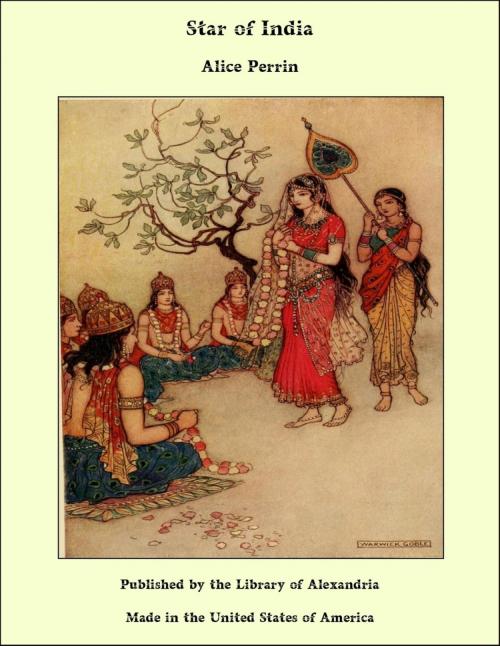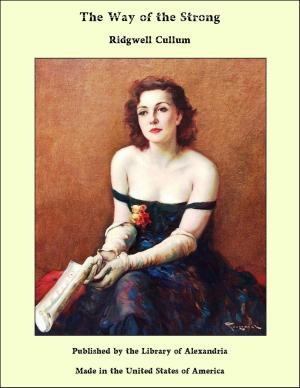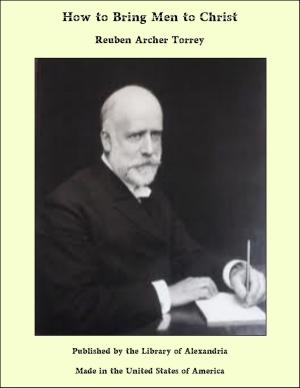| Author: | Alice Perrin | ISBN: | 9781465599315 |
| Publisher: | Library of Alexandria | Publication: | March 8, 2015 |
| Imprint: | Language: | English |
| Author: | Alice Perrin |
| ISBN: | 9781465599315 |
| Publisher: | Library of Alexandria |
| Publication: | March 8, 2015 |
| Imprint: | |
| Language: | English |
The rustic portion of the congregation shouted the familiar hymn with laborious goodwill, overpowering the more cultivated voices that rose from the chancel and the front pews—almost defeating the harsh notes wrung from the harmonium by the village schoolmistress, who also led the singing in a piercing key, supported raucously by her pupils gathered about the unmusical instrument. Even in the early 'nineties nothing so ambitious as an organ or a surpliced choir had as yet been attempted in this remote west-country parish, though with the advent of the new vicar innovations had begun; actually, of late, the high oak pews had been removed to make way for shining pitch-pine seats that in the little Norman church produced much the same effect as a garish oleograph set in an antique frame. Most of the parishioners approved the change; certainly it had the advantage of permitting everyone to observe at leisure who came to church, what they wore, and how they behaved during the sermon, even if those who were somnolently inclined found the publicity disconcerting. Stella Carrington, for one, infinitely preferred the new seats. Though no longer a child—seventeen last birthday—she could never quite forget the hours of misery she had endured in the old pew; the smell of dust and hassocks, the feeling of captivity, the desperate impulse that would assail her to kick open the door, to fling a prayer-book over the barrier, to jump up on the seat; only the fear of grandmamma's wrath had restrained her from such antics. This Sunday, as she stood between Aunt Augusta and Aunt Ellen, singing the hymn that preceded the sermon, recollections returned to her of her childhood's trials in the high pew, and with these, unaccountably, came the old sense of imprisonment. The feeling disturbed her; she searched her mind for the cause, and became conscious that it was somehow connected with the presence of Maud Verrall, seated with her parents in the religious preserve of the Squire and his family in the chancel. The Verralls had been absent from The Court for a considerable period, and now here was Maud, who when Stella last saw her had been in short petticoats with her hair down her back, transformed into a young lady; she had a curled fringe, bangles and puffed sleeves; her dress touched the ground, she had a waist, and her hat, of a fashionable sailor shape, was set well to the back of her head. And all this though she was no older than her former playmate, Stella Carrington, whose skirts even now barely reached her ankles, whose hair still hung in a plait, whose hat, in her own opinion, was more suited to a child in a perambulator than to a girl of seventeen. No wonder she felt stifled, cramped! She realised why the memory of her tortures in the old box-like pew had recurred to her mind; and then suddenly the hymn that she knew so well and had sung on such countless Sundays, paying no special heed to the words, struck her as the acme of hypocrisy.
The rustic portion of the congregation shouted the familiar hymn with laborious goodwill, overpowering the more cultivated voices that rose from the chancel and the front pews—almost defeating the harsh notes wrung from the harmonium by the village schoolmistress, who also led the singing in a piercing key, supported raucously by her pupils gathered about the unmusical instrument. Even in the early 'nineties nothing so ambitious as an organ or a surpliced choir had as yet been attempted in this remote west-country parish, though with the advent of the new vicar innovations had begun; actually, of late, the high oak pews had been removed to make way for shining pitch-pine seats that in the little Norman church produced much the same effect as a garish oleograph set in an antique frame. Most of the parishioners approved the change; certainly it had the advantage of permitting everyone to observe at leisure who came to church, what they wore, and how they behaved during the sermon, even if those who were somnolently inclined found the publicity disconcerting. Stella Carrington, for one, infinitely preferred the new seats. Though no longer a child—seventeen last birthday—she could never quite forget the hours of misery she had endured in the old pew; the smell of dust and hassocks, the feeling of captivity, the desperate impulse that would assail her to kick open the door, to fling a prayer-book over the barrier, to jump up on the seat; only the fear of grandmamma's wrath had restrained her from such antics. This Sunday, as she stood between Aunt Augusta and Aunt Ellen, singing the hymn that preceded the sermon, recollections returned to her of her childhood's trials in the high pew, and with these, unaccountably, came the old sense of imprisonment. The feeling disturbed her; she searched her mind for the cause, and became conscious that it was somehow connected with the presence of Maud Verrall, seated with her parents in the religious preserve of the Squire and his family in the chancel. The Verralls had been absent from The Court for a considerable period, and now here was Maud, who when Stella last saw her had been in short petticoats with her hair down her back, transformed into a young lady; she had a curled fringe, bangles and puffed sleeves; her dress touched the ground, she had a waist, and her hat, of a fashionable sailor shape, was set well to the back of her head. And all this though she was no older than her former playmate, Stella Carrington, whose skirts even now barely reached her ankles, whose hair still hung in a plait, whose hat, in her own opinion, was more suited to a child in a perambulator than to a girl of seventeen. No wonder she felt stifled, cramped! She realised why the memory of her tortures in the old box-like pew had recurred to her mind; and then suddenly the hymn that she knew so well and had sung on such countless Sundays, paying no special heed to the words, struck her as the acme of hypocrisy.















